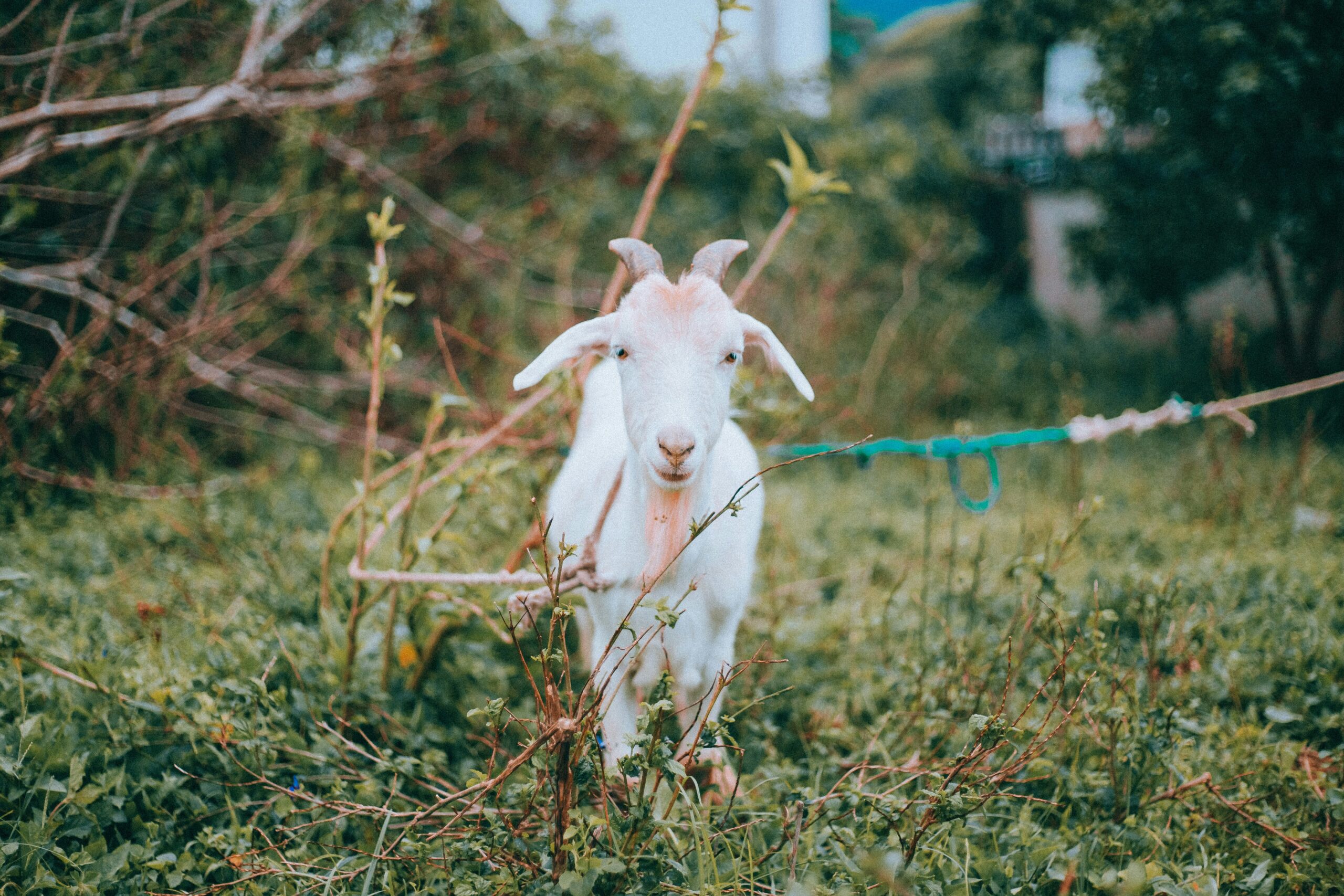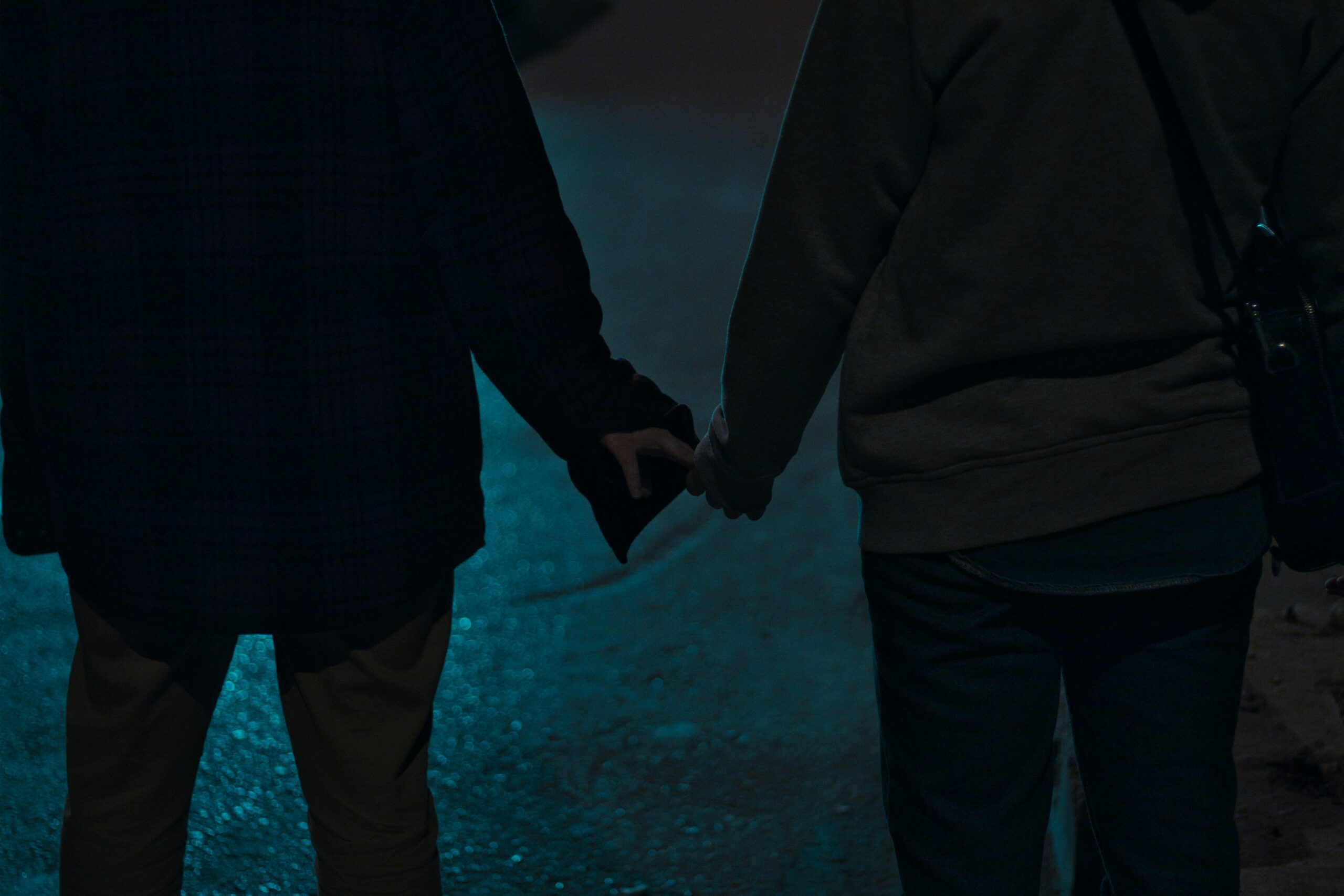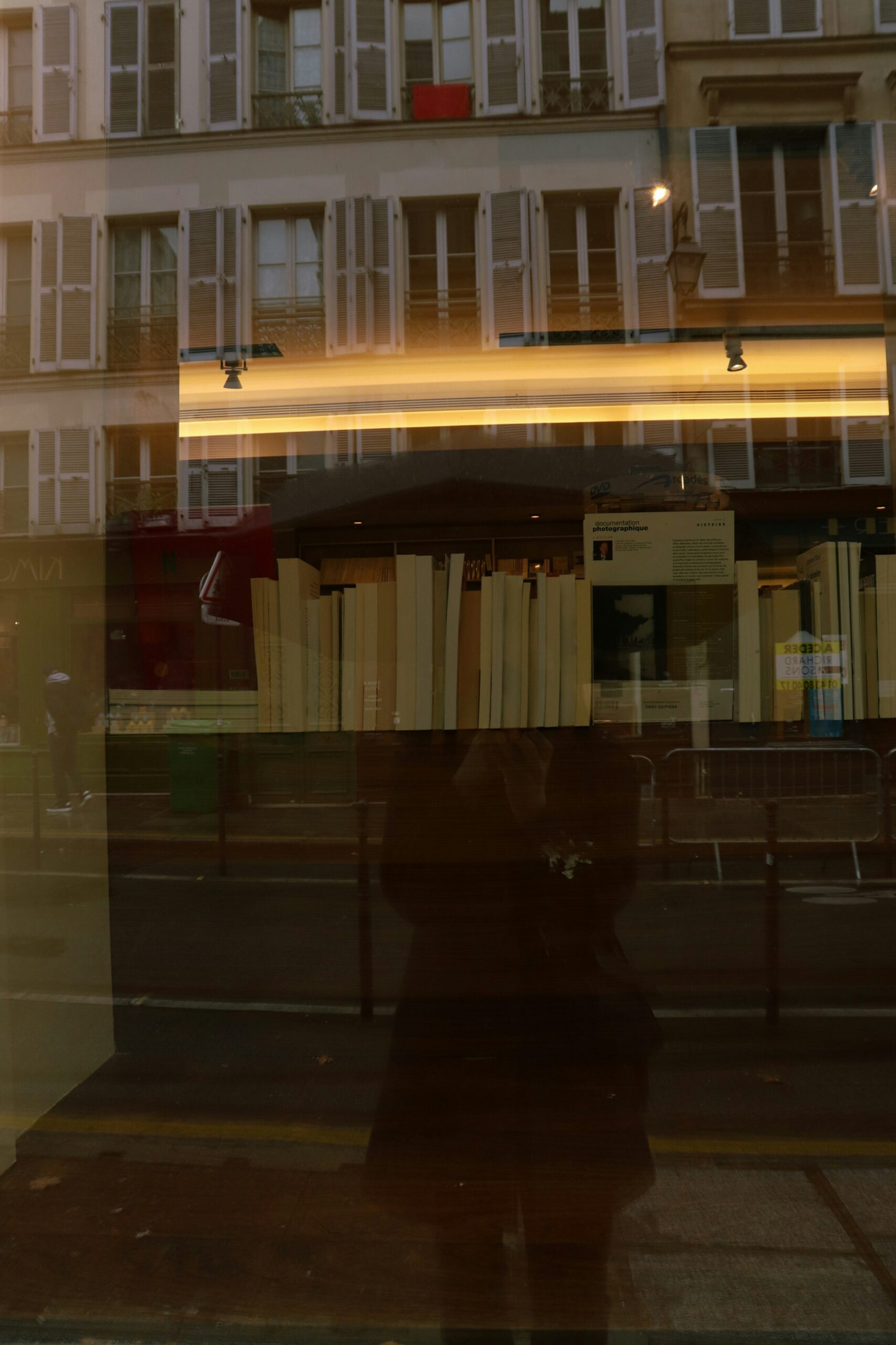| Ekta Rathore | July 2025 | Short Story |
The retreating sun had allowed the slowly shifting sand dunes to cool. The faint whistle of the evening train hollered over the peacock’s song. This was Gogo’s cue to bleat for his evening feeding. Rumi ran to her Maa. ‘It’s time, Maa,’ she said.
Rumi and Maa walked to the barn. They untied Gogo and let the kid feed from his mother, but just enough. After a few minutes, Maa pulled him back and milked the mother for the evening tea. The mother, though frustrated, obliged. Gogo ran straight towards the dunes, and Rumi tried to keep up.
***
Rumi was laughing at the little white goat attempting to climb the neem tree after her when she heard Maa’s call. Gogo jolted with glee when he saw Rumi climb down. They started for home.
Rumi heard a bleeding bleat halfway home; she turned back to see Gogo’s little horns stuck in a barbed fence. She frantically ran to him, untangled and picked him up. Just a few weeks old, he was already too heavy for Rumi. Rumi stopped every few minutes to catch her breath and readjust the kid in her arms. She gently let him go as they entered their small, yellow house with paint chipped in strange patterns.
Maa was going to the temple that evening. Rumi watched Maa get dressed in front of a small, red plastic mirror placed gently against the wall. With a chirpy hum, Maa put on her best yellow sari, a bright red bindi and a splash of colour on her lips.
Rumi and Gogo followed Maa as she stepped out to join the women headed to the temple. Seeing her, an immediate, uncomfortable silence fell over the group.
‘Where are you headed, all dressed up?’ the woman in an orange sari asked Maa with a carelessly disguised smirk.
‘With you, of course! To the temple!’ said Maa, her smile wide.
A woman whispered something in a friend’s ear, who let out a giggle. Another neighbour stared at her feet silently, avoiding Maa’s gaze. Rumi saw the smile fade off Maa’s face as a realisation set in.
‘But surely you know you cannot join us, Sona. Don’t you?’ the woman in the orange saree said, her eyes round with fake surprise. ‘Maybe you can come along next year, when you finally bear your man a son,’ she added.
Rumi could tell Maa was hurt when her lips curled downward and her eyes narrowed in their struggle to keep the tears locked in. Maa walked back inside. She immediately changed back into one of her old saris. Her bindi was gone, the colour on her lips wiped off. She started cooking dinner, her arms moving with more vigour than usual, as if the chapatis were the culprit.
‘Rumi’s Maa, where are you?’ Baba called for Maa when he was back.
A restless Rumi wished Maa would tell Baba about everything. He would go and set them all straight, she thought. But Maa did not say anything.
Rumi dashed towards the earthen pot sitting on the floor, oozing droplets that had dampened the floor and softened the walls. She filled a glass of water for Baba and walked to him. ‘Baba! Maa was crying earlier today, because the women would not let her come along to the temple!’
‘She wouldn’t have to cry so much if she could just birth a son. Women are birthing boys left, right and centre.’ Baba muttered, without looking at Maa.
***
That night, Gogo lay next to Rumi in silence as Rumi stroked his fur. He let out a sleepy bleat and dozed off. His white fur smelled of dirt and summer. A chorus of insects chirped in the background, like an ominous orchestra.
In the chimney’s steady light, Dadi was painting Maa’s hand with henna. Dadi loved henna. Since Dada died, she could not have henna bejewel her own palms, and putting henna on Maa gave her an excuse to paint her own hands with deliberate recklessness. Then, she would dramatically yell “Oh lord, how did this happen!” and make a big show of washing off the henna right away.
Every night, Rumi would beg Dadi for a story. Dadi had the precision of a storyteller, her tales full of larger-than-life characters and dramatic pauses, her voice rising and falling with the grace of a snake. But today, Rumi had other questions in her mind.
‘What will happen when I have a brother, Dadi?’ She asked, turning her gaze away from the flowery patterns on Maa’s hands.
‘There will be a grand celebration. The sounds of dhol and nagara will fill the town, and the little boy’s laugh will fill our home. Our relatives will come from faraway lands with shiny gifts for the new baby. All the women in the town will come here to sing songs of celebration. You’ll see.’ Dadi told her.
‘Did they do all that when I was born?’
‘No. You are a girl.’
***
Baba always left for the shop early in the morning. When school was off, Rumi would go along with him, and Gogo would follow her. It was Sunday. After a big breakfast of roti crushed in curd, they left for the shop.
Baba rolled the shutter up, and Rumi began the morning prayers. She cleaned the floor, neatly restacked the boxes and sat down with her schoolbooks. She would occasionally look up and listen intently when a customer came with some gossip or hide away if she saw a teacher from school. A few weeks ago, her mathematics teacher had taken buying groceries from the shop as an opportunity to tell Baba that she had written “Aishwarya Rai” in place of her name in her textbooks. Baba had planted a sonorous slap on her face without missing a beat, and a curious crowd had gathered around the shop.
Around the afternoon, Rumi was getting ready to bring hot lunch for Baba when a neighbour came bearing sweets. Rumi thought all the hot jalebis were theirs to take, but the man gave her two before he pinched her cheek with his syrup-laced fingers.
‘I have welcomed my fourth son,’ the man teased Baba. ‘This is the fourth time I have brought you jalebis, about time you return the favour! Such a miser you are!’
The man laughed loudly, and Baba forced a smile with his jaw clenched.
***
Rumi had started to pray for a brother. Standing in a line of school kids in the morning assembly, she would murmur, ‘Please god, give me a baby brother. I promise I will study hard and will stop bothering you for good marks. I promise!’
***
The next week started with Dadi waking up Rumi for school.
‘I have boiled some milk for you. Take it from the kitchen. Finish it.’
‘Where have Maa and Baba gone?’ Rumi asked.
‘To make a promise to the Gods.’
‘What do Maa and Baba have that the Gods don’t?’
Dadi did not respond.
***
‘Rumi! Where are you? Stop playing with the damn goat and come take care of your brother!’ Maa screeched from inside.
Rumi dragged her feet inside. Gogo followed her.
The birth of the little boy was everything Nani had promised it would be. The house overflowed with sweets and delicacies for days. The women who had once snubbed Maa came offering their friendship and admiration for the baby. Relatives travelled from faraway places with toys and tiny clothes.
‘It is not for you!’ Nani grumbled at her when she caught Rumi eyeing a little bicycle.
‘But he cannot even lift his head yet! Can I please play with it until he is old enough to ride it?’ Rumi begged.
‘You are going to ruin the boy’s bicycle. He should get to ride it when it is still new and shiny.’
Having a brother was not as exciting as Rumi had thought. She thought that her little brother was rather odd-looking. Maa was always with him, cooing, singing and talking to him like he understood. Rumi waited until the boy was asleep to talk to Maa. Maa did not see Rumi anymore, and when she did, it only annoyed her.
Maa and Dadi had endless measures in place to protect the baby from the evil eye. He wore a pendant that had a piece of the umbilical cord stashed inside it. They had also given him tiny kadas for his uncontrolled arms. His ankles were adorned with little black pearls. Maa used the kohl in her eyes to mark the baby’s forehead.
‘It makes him look odd,’ Rumi could not help commenting one day. Maa shot a deathly glare at her.
Gogo was endlessly fascinated with the little boy. He bleated with joy when the baby made happy sounds. He manically jumped around the small cot, his hooves tip-tapping on the mud floor. This would anger Maa to no end. She would curse Gogo and throw at him whatever she was holding at the time to chase him out.
***
One morning, Gogo was nowhere to be seen. Rumi was not worried. Ever since he had grown a little, he had been going out on his own. He always danced back home.
Outside, a crowd was walking towards the temple with excited steps. Bored by herself in the house, Rumi walked along with them.
Spectators had gathered at the temple in curious anticipation. Excited children had climbed the wall around it. Men clamoured around in a circle, some holding their kids on their shoulders.
Rumi lifted her head to catch a glimpse. It was a white goat with a garland of flowers around the neck. He locked eyes with Rumi and tried to run to her. But two men were holding him by his newly grown horns, keeping him still. Gogo bleated miserably; he knew what was about to happen before Rumi did. The taller of the two men wrapped his dirty palm around his mouth to silence him. She caught the flash of a sword before she heard the swoosh and thud of it. Gogo’s head fell off the rest of his body like they were only temporarily attached, like a cheap toy. His headless corpse was not immediately lifeless. Four legs and a torso ran towards Rumi after the head had fallen in the middle of the temple. The garland fell on the floor. The air slowly grew pungent with the smell of blood and betrayal. The blood coloured Gogo’s fur, making him unrecognisable. Gogo was like a beheaded goddess, with her lush locks flying around as her face resting in eternal horror. His blood crawled towards Rumi like many venomous serpents emerging from their burrows. What remained of Gogo stained Rumi’s bare, unmoving feet a crisp shade of red.
***
At night, Rumi sat on the porch as the village feasted. Baba had cooked the mutton in a big cauldron, behind the house. He proudly filled all plates with the thick, fragrant curry. He brought a plate to Rumi.
‘Here, I saved the best piece for you. The heart.’
He picked up Gogo’s heart from the plate and brought it up to Rumi’s mouth.
With a gulp, Rumi ate it whole.
***
‘Which class is she in?’ Rumi asked her friend. She was, not is, Rumi corrected herself in her head.
Rumi was walking home from school with her friend, the sun blazing above them. Men sat outside small tea stalls, sipping hot tea. The air was heavy with the fragrance of pakoras being fried in boiling oil. Sweat mixed with the coconut oil in Rumi’s braided hair.
‘She was a few years ahead of us. The principal had once asked her to step down from the stage. Do you remember? She had picked a Bollywood song for her dance performance. He was so mad about that!’ her friend recalled.
Rumi remembered that. This had happened a couple of years ago. The girl had wept through the day. No girl had danced to a Bollywood number since.
‘And she just died? But how?’
‘I do not know. My sister is in her class. Their class teacher told them today about the whole thing.’
Rumi had seen the girl in school and in the shop. She had sat next to her during an exam last year. When she saw Rumi, clueless and sweating at the sight of the questions, she smiled in uncertain encouragement. That was the extent of their interaction. But it was enough for Rumi to feel the loss. Her throat choked from suppressing an embarrassed sob. Can people suddenly stop existing? What happens to their things, their books? Who sleeps in their beds when they go away? Rumi had so many questions. She had seen people carry dead bodies for cremation, but never a small one.
Rumi waited until home to let the tears out. Maa was amused.
‘What happened?’ she asked, ‘Did you fail a test?’
Rumi told her. A girl had died, just like that.
In between Rumi’s gasps, Maa asked her, ‘Did the girl have a brother?’
Rumi felt Gogo’s heart skip a beat inside her.
_________________________

Ekta Rathore is a writer and researcher based in Delhi. Her work crawls the intersections of memory, language, and the spectral, often lingering on the fragile textures of the everyday. When she’s not writing, she can be found rummaging through secondhand bookstores or chasing stray ideas into notebooks.
_________________________
Feature Photo by Moises Alex on Unsplash
Find MeanPepperVine on Instagram @MeanPepperVine



